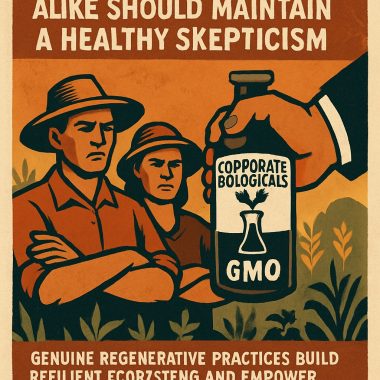Is Big Ag Hijacking Organic to Push GMOs?
In a shrewd display of marketing opportunism, Big Agribusiness has shifted its focus to promoting “biologicals” … products derived from living organisms… while using respected organic advocates like Robert F. Kennedy Jr. as unwitting frontmen.
Kennedy, now serving as U.S. Secretary of Health and Human Services, was part of the legal team that helped win a landmark case against Bayer’s Roundup herbicide. His longstanding advocacy for organic farming and reducing toxic exposures makes him an ideal symbol for the “natural” farming movement.
However, major agribusiness players are cynically exploiting this symbolism to market biologicals that often bear little resemblance to actual organic practices.
Biologicals can include genuinely natural methods such as releasing ladybugs to control aphids or using nematodes against slugs. Yet, under the same label, corporations like Bayer, Syngenta, and Mosaic are pushing genetically engineered microbes—GMOs—onto the farming world. The motive is clear: genetically modified organisms are patentable, profitable, and easier to control in the marketplace, especially as many farmers grow weary of the damage chemical inputs have inflicted on soil health and ecosystems.
Blurring the Line Between Organic and GMO
An article in the farming press makes the pivot strategy painfully clear. It starts by quoting an organic farmer praising reduced chemical use and crediting RFK Jr. for helping spread awareness. But within paragraphs, the focus shifts to “biological” products being developed by Big Ag’s GMO giants. Bayer and Syngenta are making significant investments in the biological sector, which currently represents a $15 billion global market and is projected to grow to $25 billion by 2030, according to research firm DunhamTrimmer.
Meanwhile, the $70 billion conventional agrochemical market—dominated by the same players—is growing only about 3% annually. To maintain profitability, these companies are banking on “biologicals” to appear eco-friendly while continuing their monopolistic control over agriculture.
Syngenta’s global head of seed care and biologicals, Jonty Brown, recently declared, “Farmers, no matter where you go in the world, say they want to use biologicals.” This framing implies that transitioning to “biologicals” is a natural extension of organic principles. Yet many products being marketed under this banner are anything but natural.
GMO “Biologicals” Present Uncertain Prospects
The reality behind some of these GMO biologicals is far less impressive than their marketing suggests. Pivot Bio, for example, has released gene-edited nitrogen-fixing microbial products aimed at reducing synthetic nitrogen fertilizer use. In theory, these products could transform farming by reducing dependence on chemical fertilizers, major contributors to greenhouse gas emissions and water pollution.
However, a 2023 analysis of 26 university-conducted corn trials found underwhelming results. Twenty-five of the trials showed no significant yield improvement from Pivot Bio’s GM products compared to conventional microbial treatments.
More critically, neither GM nor non-GM biologicals consistently outperformed fields simply treated with synthetic nitrogen. In the researchers’ own words: “Overall products, there were 53 corn experiments on biological nitrogen-fixer products, with 51 experiments finding no benefit to their use.” Only two experiments showed any yield advantage.
Given these findings, researchers strongly advise farmers to maintain a healthy skepticism towards biologicals that promise to replace fertilizer inputs. The data suggests that marketing hype far exceeds real-world benefits, at least with current products.
Safety Concerns and Regulatory Shortcomings
Beyond questions of effectiveness, there are legitimate concerns about the safety of genetically engineered microbial products. According to The New York Times’s Eric Lipton reporting, Pivot Bio and other companies lobbied aggressively to minimize regulatory scrutiny of these products. Their argument: if a genetically modified microbe does not pose an obvious “plant pest” threat, it should be exempt from USDA regulation (Lipton, 2024).
This lobbying bore fruit. In 2024, the USDA issued guidance stating that its review of GM microorganisms would focus narrowly on plant pest risks. This limited scope leaves questions about human health, environmental impact, and long-term ecosystem disruption largely unaddressed.
Pivot Bio’s nitrogen-fixing bacteria were reviewed through the USDA’s “Am I Regulated?” process and found to be non-regulated, meaning they bypassed broader safety evaluations. Pivot heralded this as a “precedent-setting determination” that should ease the commercialization of similar genetically modified microbes.
While Pivot claims that its products were also reviewed by the EPA and FDA, critics argue that current federal regulations for biotechnology are outdated and fragmented. A report by the National Academies of Sciences called for a major overhaul of the U.S. regulatory system, noting that “the complexity of emerging biotechnologies has outstripped the capacity of the current regulatory framework.”
The Misuse of Regenerative Agriculture Language
The most troubling aspect of this Pivot is Big Agribusiness’s attempt to rebrand itself as the champion of regenerative agriculture—an approach that traditionally emphasizes soil health, biodiversity, and minimal synthetic input. Companies are now co-opting terms like “regenerative” and “sustainable” to sell genetically engineered products that often entail risks of ecosystem disruption, monocultures, and farmer dependence on patented technologies.
This greenwashing effort mirrors earlier tactics used to market GMOs in the 1990s as the “solution” to world hunger. In reality, GMOs largely entrenched corporate control over seeds and farming practices while delivering mixed or disappointing results in terms of yield improvements and environmental benefits.
What Would RFK Jr. Say?

Given his outspoken support for organic farming and skepticism toward corporate influence in public health, it’s unlikely that Robert F. Kennedy Jr. would support the GMO-based “biologicals” now being pushed by Big Ag under his name. His lifetime advocacy has consistently opposed precisely this kind of corporate capture and regulatory gaming.
However, public figures can easily be used as marketing tools without their consent in the complex media landscape. The strategy is simple: borrow the credibility of organic advocates to sell products that, at best, only mimic organic ideals and, at worst, further entrench industrial agriculture’s dominance over our food systems.
The Big Bad “Biologicals” Deception
As Big Agribusiness floods the market with biologicals, farmers and consumers alike should maintain a healthy skepticism. Genuine regenerative practices build resilient ecosystems and empower farmers. Corporate biologicals, especially those involving GMOs, often serve very different goals—ones centered on control, dependency, and profit.
True regenerative agriculture remains incompatible with a system that treats life itself as a patentable commodity. The future of farming should be built on transparency, ecological stewardship, and public accountability—not greenwashed marketing campaigns backed by companies with long records of prioritizing profits over public health.
Source: https://www.offthegridnews.com/off-grid-foods/is-big-ag-hijacking-organic-to-push-gmos/
Anyone can join.
Anyone can contribute.
Anyone can become informed about their world.
"United We Stand" Click Here To Create Your Personal Citizen Journalist Account Today, Be Sure To Invite Your Friends.
Before It’s News® is a community of individuals who report on what’s going on around them, from all around the world. Anyone can join. Anyone can contribute. Anyone can become informed about their world. "United We Stand" Click Here To Create Your Personal Citizen Journalist Account Today, Be Sure To Invite Your Friends.
LION'S MANE PRODUCT
Try Our Lion’s Mane WHOLE MIND Nootropic Blend 60 Capsules
Mushrooms are having a moment. One fabulous fungus in particular, lion’s mane, may help improve memory, depression and anxiety symptoms. They are also an excellent source of nutrients that show promise as a therapy for dementia, and other neurodegenerative diseases. If you’re living with anxiety or depression, you may be curious about all the therapy options out there — including the natural ones.Our Lion’s Mane WHOLE MIND Nootropic Blend has been formulated to utilize the potency of Lion’s mane but also include the benefits of four other Highly Beneficial Mushrooms. Synergistically, they work together to Build your health through improving cognitive function and immunity regardless of your age. Our Nootropic not only improves your Cognitive Function and Activates your Immune System, but it benefits growth of Essential Gut Flora, further enhancing your Vitality.
Our Formula includes: Lion’s Mane Mushrooms which Increase Brain Power through nerve growth, lessen anxiety, reduce depression, and improve concentration. Its an excellent adaptogen, promotes sleep and improves immunity. Shiitake Mushrooms which Fight cancer cells and infectious disease, boost the immune system, promotes brain function, and serves as a source of B vitamins. Maitake Mushrooms which regulate blood sugar levels of diabetics, reduce hypertension and boosts the immune system. Reishi Mushrooms which Fight inflammation, liver disease, fatigue, tumor growth and cancer. They Improve skin disorders and soothes digestive problems, stomach ulcers and leaky gut syndrome. Chaga Mushrooms which have anti-aging effects, boost immune function, improve stamina and athletic performance, even act as a natural aphrodisiac, fighting diabetes and improving liver function. Try Our Lion’s Mane WHOLE MIND Nootropic Blend 60 Capsules Today. Be 100% Satisfied or Receive a Full Money Back Guarantee. Order Yours Today by Following This Link.






